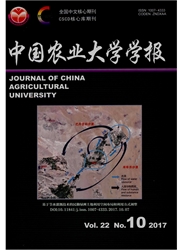

 中文摘要:
中文摘要:
以"大久保"桃(Prunus persicaL.Batsch)为试验材料,研究了不同出库方式对冰温贮藏后果实细胞壁组分以及相关酶活性的影响。研究结果表明:以低温冷链方式出库的果实在货架期期间好果率高并且出库后14 d果实硬度仍保持在12.43 kg/cm2,而缓慢升温和变温处理果实的硬度分别下降到3.45和3.33 kg/cm2,直接出库(对照)的硬度则降至2.98 kg/cm2。这可能是由于低温冷链出库降低了果实中多聚半乳糖醛酸酶(PG)和果胶甲酯酶(PE)活性,使得果实中可溶性果胶和松弛结合型多糖的含量变低,从而维持了较高的果实硬度。但低温冷链出库对果实中多酚氧化酶和过氧化物酶活性影响不大。
 英文摘要:
英文摘要:
Effect of different out-store tests after ice-temperature preservation on the cell wall components and the activities of related enzymes of the 'Okubao' peaches(Prunus persica L.Batsch.) was investigated.It was found that the good fruit rate remains high under low-temperature chain storage condition,and the value of fruit firmness remains at 12.43 kg/cm2 after 14 days of periods of out-store.Meanwhile,the values of fruit firmness of progressively warming and intermittent warming treatments are 3.45 kg/cm2 and 3.33 kg/cm2 respectively,whereas the control is 2.98 kg/cm2.This may be due to: the activities of the polygalacturonase(PG) and pectinesterase(PE) are reduced under low-temperature chain storage condition,and to lower the contents of soluble pectin and the loosely bound matrix glycans,thereby the value of the fruit firmness remained at the similar level.However,the low-temperature chain storage condition had no apparent effect on the activities of polyphenol oxidase(PPO) and peroxidase(POD).
 同期刊论文项目
同期刊论文项目
 同项目期刊论文
同项目期刊论文
 期刊信息
期刊信息
